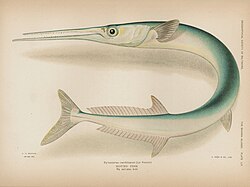オキザヨリ
| オキザヨリ | ||||||||||||||||||||||||
|---|---|---|---|---|---|---|---|---|---|---|---|---|---|---|---|---|---|---|---|---|---|---|---|---|
 The Bahama Islands(The Geographical Society of Baltimore 1905)によるイラスト
| ||||||||||||||||||||||||
| 分類 | ||||||||||||||||||||||||
| ||||||||||||||||||||||||
| 学名 | ||||||||||||||||||||||||
| Tylosurus crocodilus (Péron & Lesueur, 1821) | ||||||||||||||||||||||||
| 英名 | ||||||||||||||||||||||||
| Houndfish | ||||||||||||||||||||||||
| 亜種 | ||||||||||||||||||||||||
|
オキザヨリ(Tylosurus crocodilus)はダツ科に属する魚類。この科では最大で1.5mに達する。ゲームフィッシュである。
形態
[編集]棘条はない。背鰭は21–25軟条、臀鰭は19–22軟条[1]。脊椎骨数80–86[1]。幼魚の歯が前方を向くことで、他のテンジクダツ属と識別できる(他種は常に真っ直ぐ)[2]。体は円筒形だが、他のダツ類に比べより太く、頭部が短い[1]。背面は濃紺、側面は銀白色、腹面は白[3]。明瞭な尾柄隆起があり、尾鰭は強く二叉する[1]。幼魚は背鰭後部が黒く伸長する[1]。最大全長150cm[4]、最大重量6.35kgの記録がある[5]。
分布
[編集]インド太平洋では、西は紅海・南アフリカ[3]、東はフランス領ポリネシア[6]、北は日本[7]、南はニューサウスウェールズ[8] までで見られる。大西洋では、西はニュージャージーからブラジル[9]、東はビオコ島・カメルーン・リベリアからアセンション島まで[10]。ギニア・セネガル[11]・カーボベルデ[12] 近辺でも見られる。東太平洋ではT. c. crocodilusではなく亜種T. c. fodiatorが生息し[1]、カリフォルニア湾からココ島・パナマまで見られる[13]。
生態
[編集]外洋回遊性で[14]、単独か小さな群れで礁湖・サンゴ礁に近づき[1]、主に小魚を食べる[15]。卵には付着糸があり、海藻に付着する[16]。
人との関連
[編集]
他のダツのようにゲームフィッシュとされ、集魚灯を用いて捕獲される。食用になるが、ハマダツのように骨が緑色であるため販売されることは珍しい[17]。驚いた時・強い光を浴びた時に水面から飛び出し、突き刺さるため漁業者に恐れられている[1]。
出典
[編集]- ^ a b c d e f g h Froese, Rainer and Pauly, Daniel, eds. (2009). "Tylosurus crocodilus" in FishBase. 03 2009 version.
- ^ Collette, B.B. 1999 Belonidae. Needlefishes. p. 2151-2161. In: K.E. Carpenter and V.H. Niem (eds.) FAO species identification guide for fishery purposes. The living marine resources of the Western Central Pacific. Volume 4. Bony fishes part 2 (Mugilidae to Carangidae). FAO, Rome.
- ^ a b Collette, B.B. 1986 Belonidae p. 385-387. In M.M. Smith and P.C. Heemstra (eds.) Smiths' sea fishes. Springer-Verlag, Berlin.
- ^ Sommer, C., W. Schneider and J.-M. Poutiers 1996 FAO species identification field guide for fishery purposes. The living marine resources of Somalia. FAO, Rome. 376 p.
- ^ IGFA 2001 Database of IGFA angling records until 2001. IGFA, Fort Lauderdale, USA.
- ^ Randall, J.E. and Y.H. Sinoto 1978 Rapan fish names. B.P. Bishop Mus. Occas. Pap. 24(15:294-306.
- ^ Masuda, H., K. Amaoka, C. Araga, T. Uyeno and T. Yoshino 1984 The fishes of the Japanese Archipelago. Vol. 1. Tokai University Press, Tokyo, Japan. 437 p. (text)
- ^ Fricke, R. 1999 Fishes of the Mascarene Islands (Réunion, Mauritius, Rodriguez): an annotated checklist, with descriptions of new species. Koeltz Scientific Books, Koenigstein, Theses Zoologicae, Vol. 31: 759 p.
- ^ Robins, C.R. and G.C. Ray 1986 A field guide to Atlantic coast fishes of North America. Houghton Mifflin Company, Boston, U.S.A. 354 p.
- ^ Collette, B.B. and N.V. Parin 1990 Belonidae. p. 592-597. In J.C. Quero, J.C. Hureau, C. Karrer, A. Post and L. Saldanha (eds.) Check-list of the fishes of the eastern tropical Atlantic (CLOFETA). JNICT, Lisbon; SEI, Paris; and UNESCO, Paris. Vol. 2
- ^ Diouf, P.S. 1996 Les peuplements de poissons des milieux estuariens de l'Afrique de l'Ouest: L'exemple de l'estuaire hyperhalin du Sine-Saloum. Université de Montpellier II. Thèses et Documents Microfiches No.156. ORSTOM, Paris. 267 p.
- ^ Reiner, F. 1996 Catálogo dos peixes do Arquipélago de Cabo Verde. Publicações avulsas do IPIMAR No. 2. 339 p.
- ^ "Mexican needlefish". FishBase. Ed. Ranier Froese and Daniel Pauly. April 2009 version. N.p.: FishBase, 2009.
- ^ Claro, R. 1994 Características generales de la ictiofauna. p. 55-70. In R. Claro (ed.) Ecología de los peces marinos de Cuba. Instituto de Oceanología Academia de Ciencias de Cuba and Centro de Investigaciones de Quintana Roo.
- ^ Thollot, P. 1996 Les poissons de mangrove du lagon sud-ouest de Nouvelle-Calédonie. ORSTOM Éditions, Paris.
- ^ Breder, C.M. and D.E. Rosen 1966 Modes of reproduction in fishes. T.F.H. Publications, Neptune City, New Jersey. 941 p.
- ^ Cervigón, F., R. Cipriani, W. Fischer, L. Garibaldi, M. Hendrickx, A.J. Lemus, R. Márquez, J.M. Poutiers, G. Robaina and B. Rodriguez 1992 Fichas FAO de identificación de especies para los fines de la pesca. Guía de campo de las especies comerciales marinas y de aquas salobres de la costa septentrional de Sur América. FAO, Rome. 513 p. Preparado con el financiamento de la Comisión de Comunidades Europeas y de NORAD.
